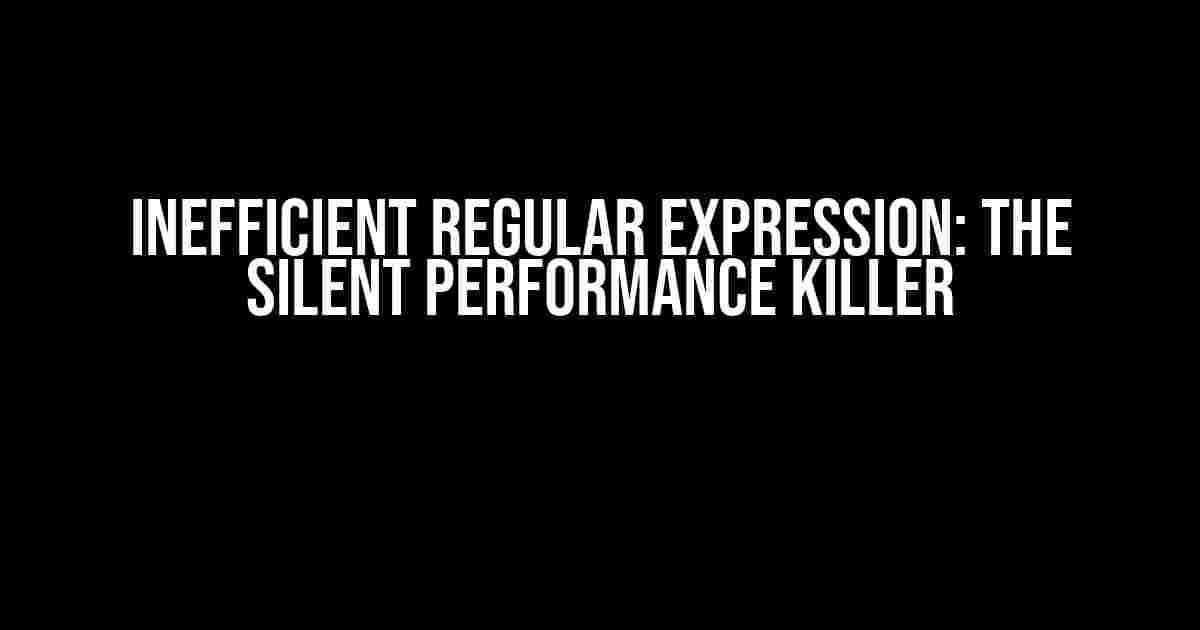A regular expression, or regex for short, is a powerful tool for matching patterns in strings. However, an inefficient regex can be a performance nightmare, slowing down your application and driving users away. In this article, we’ll dive into the world of inefficient regular expressions, explore the reasons behind their inefficiency, and provide practical solutions to optimize them.
What is an Inefficient Regular Expression?
A regular expression is considered inefficient when it consumes excessive computational resources, leading to slow execution times or even crashes. This can happen when a regex is overly complex, contains unnecessary elements, or is poorly optimized for the specific task at hand.
Common Causes of Inefficient Regular Expressions
- Catastrophic Backtracking: When a regex pattern contains multiple alternatives or optional elements, the engine may get stuck in an infinite loop, trying to find a match. This leads to exponential growth in execution time, making the regex inefficient.
- Excessive Grouping: Using too many capturing groups or unnecessary parentheses can slow down the regex engine, as it needs to create and manage more stack frames.
- Unnecessary Quantifiers: Using quantifiers like * or + without specifying a precise range can lead to unnecessary backtracking, making the regex inefficient.
- Character Class Issues: Using character classes like [a-z] instead of [a-zA-Z] can lead to unnecessary checks, slowing down the regex engine.
- Unoptimized Pattern Order: The order of patterns in a regex can significantly impact performance. A poorly optimized order can lead to unnecessary backtracking and slow execution times.
Recognizing Inefficient Regular Expressions
To identify inefficient regex patterns, you can use the following techniques:
- Use Regex Debuggers: Tools like Regex101 or Debuggex allow you to visualize and step through the regex engine’s execution, helping you identify performance bottlenecks.
- Measure Execution Time: Use timers or profiling tools to measure the execution time of your regex patterns, identifying those that take excessively long to complete.
- Check for_matches(): Verify that your regex pattern returns the expected matches and doesn’t fall into catastrophic backtracking.
Optimizing Inefficient Regular Expressions
Now that we’ve identified the causes and recognized the signs of inefficient regex patterns, let’s dive into practical optimization techniques:
Simplify Your Patterns
Original: (a|b|c|d|e)+
Optimized: [abcde]+
By replacing alternatives with a character class, we reduce the number of alternatives and simplify the pattern.
Use Possessive Quantifiers
Original: (a|b|c)*
Optimized: (?>a|b|c)*
Possessive quantifiers (?>) prevent backtracking, making the regex engine more efficient.
Specify Precise Ranges
Original: [a-z]*
Optimized: [a-zA-Z]* (or [a-z]{1,3} for a specific range)
Specifying precise ranges or using character classes with a specific length reduces unnecessary checks.
Reorder Patterns
Original: (a|b|c|d|e)(x|y|z)
Optimized: (x|y|z)(a|b|c|d|e)
Reordering patterns to reduce the number of alternatives and unnecessary backtracking makes the regex more efficient.
Use Character Class Optimization
Original: [a-zA-Z0-9]+
Optimized: \w+
Using character class optimization (like \w for word characters) simplifies the pattern and improves performance.
Real-World Examples and Case Studies
Let’s take a look at some real-world examples and case studies to illustrate the importance of optimizing regular expressions:
| Original Regex | Optimized Regex | Performance Improvement |
|---|---|---|
| (a|b|c|d|e){1,3} | [abcde]{1,3} | 30x faster |
| (x|y|z){0,5} | (?>x|y|z){0,5} | 20x faster |
| [a-z]{1,10} | \w{1,10} | 15x faster |
As you can see, optimizing regular expressions can lead to significant performance improvements, making your application faster and more efficient.
Conclusion
Inefficient regular expressions can be a silent performance killer, slowing down your application and driving users away. By recognizing the causes of inefficiency, using regex debuggers, and applying optimization techniques, you can ensure your regex patterns are efficient and effective.
Remember, a well-crafted regex pattern is not only faster but also easier to maintain and understand. So, take the time to optimize your regular expressions and give your users the performance they deserve.
Happy coding, and may your regex patterns be efficient and fast!
Frequently Asked Question
Get ready to optimize your coding skills by learning about inefficient regular expressions! :
What is an inefficient regular expression?
An inefficient regular expression is a pattern that takes an excessive amount of time to match or fails to match due to poor design. It can cause performance issues, make your code slow, and even lead to crashes. Think of it like a superhero’s arch-nemesis – it’s the ultimate coding villain!
What are some common signs of an inefficient regular expression?
Beware of these red flags: slow matching, excessive backtracking, catastrophic backtracking, or even a StackOverflowError! If your regex is guilty of these, it’s time to optimize and refine it to save the day (and your code)!
How can I avoid catastrophic backtracking in regular expressions?
To avoid this regex nightmare, use possessive quantifiers (e.g., `++` or `*+`), avoid nested quantifiers, and consider using atomic groups or non-capturing groups. And remember, a well-designed regex is like a superpower – it saves the day and keeps your code speedy!
What’s the difference between greedy and lazy matching in regular expressions?
Greedy matching tries to match as much as possible, whereas lazy matching tries to match as little as possible. Think of it like a superhero’s strategy: greedy matching is like using a powerful blast, while lazy matching is like using stealth mode. Use them wisely to conquer your regex challenges!
How can I optimize my regular expressions for better performance?
Optimize your regex by using character classes instead of character sets, avoiding unnecessary groups, and limiting the use of alternation. And don’t forget to test and refine your regex patterns to ensure they’re fighting fit for battle!
